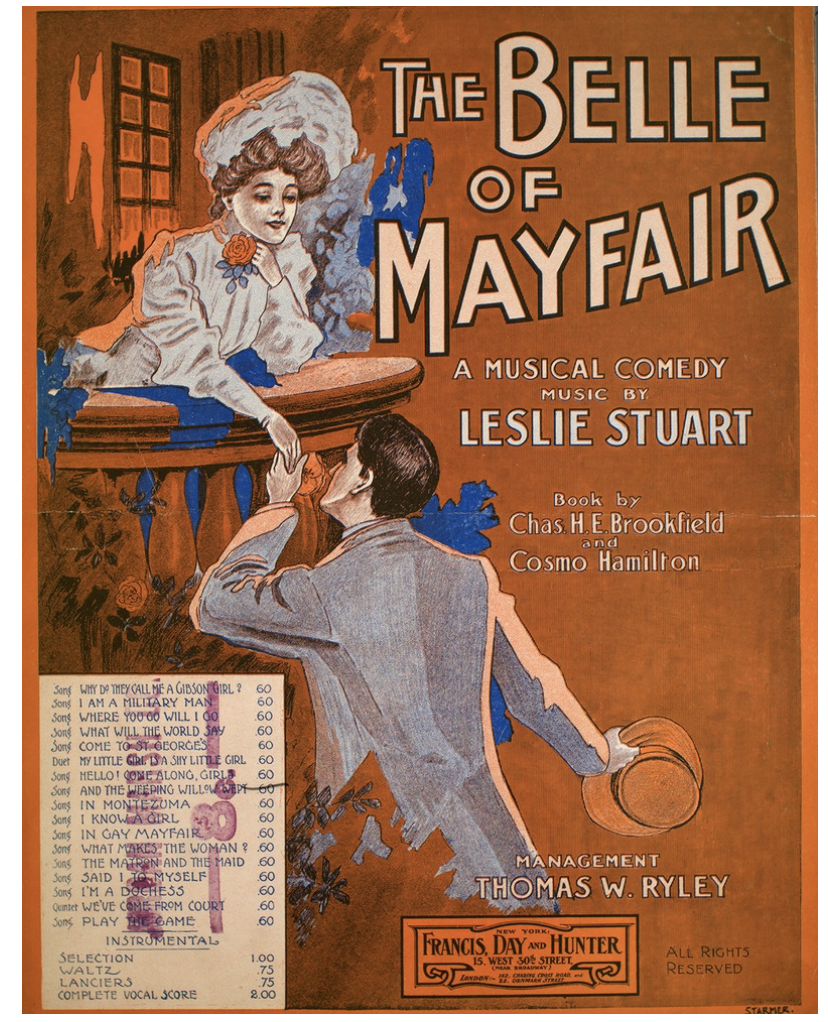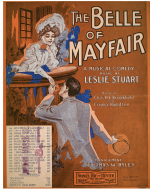Created by Jack Chambers on Mon, 04/19/2021 - 10:10
Description:
New Woman Commentary:
April 12, 1906: Wow, last night I went to an amazing show at the Vaudeville Theatre here in London. I went with my good friend Elizabeth, a fellow New Woman if you will. We went and saw the Belle of Mayfair. The main character, Julia, was played by one of our favorite actresses, Edna May, who came here from America. We had seen her a few times before in the plays Three Little Maids, and The School Girl. In my opinion, this play is a modern version of Romeo and Juliet. Julia falls madly in love with a nice man named Raymond Mount-Highgate, but Julia’s father is in a feud with Raymond’s family. Julia’s father of course in typical Victorian man fashion tries to control her life, and get rid of Raymond. He does this by getting him an overseas diplomat job as well as paying a conductor of a band to be Julia’s suitor. At the end of the play, Julia’s father finally accepts that she will marry Raymond. This play showed the hardship that us women have to face during this time period. It once again shows that men just try to control us and keep us from having our voices heard, which is why the suffrage movement is so important to us New Women. If Julia had the right to vote at the time, I believe this play would be so much different. Having the right to vote may have implored her to take a stand against the overbearing men in her life. A Julia, who understood all the values of the New Woman, would show all the women at this show that us women can have power too, and that starts with the right to vote.
Editorial Commentary:
The Belle of Mayfair was the rave of the London play industry in 1906. This play ran for a year starting from April 11, 1906 and ran for an entire year until April 13, 1907 (The Belle of Mayfair). There were a total of 431 performances of this show during that time. Like many people in London, this woman, the New Woman, enjoyed this show. This woman was lucky enough to go on opening night which shows that she had some money to her name. Given the New Woman’s remarks about the show; this woman was most likely independently wealthy. This woman likely was one of the few women in London to have their own successful business without the need of a man. An interesting remark that this woman had about the show was her point about how Victorian men always try to control women’s lives. Her remark here sums up one of the big reasons that the New Woman movement picked up steam around this time. That and of course the suffrage movement that was occurring at the time. This woman, the New Woman, as seen earlier in her journal was part of the suffrage movement in an effort to obtain the right to vote in England. While this woman clearly did enjoy parts of the play, she had some reservations due to her values as a New Woman. In particular, her distaste for the actions of her father, and Julia’s lack of initiative to take a strong stand.
Citation:
“The Belle of Mayfair. A Musical Comedy. And the Weeping Willow Wept.” 145.027 - The Belle of Mayfair. A Musical Comedy. And the Weeping Willow Wept. | Levy Music Collection, levysheetmusic.mse.jhu.edu/collection/145/027.


